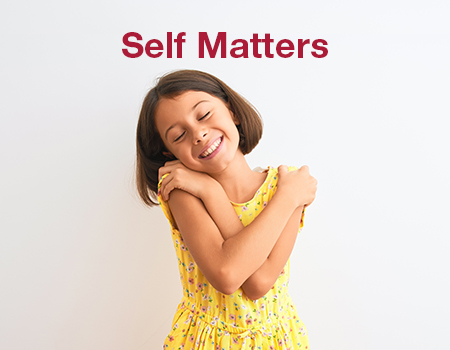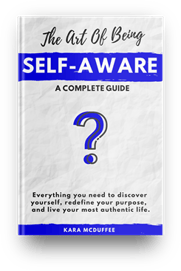Self-awareness is our ability to identify our thoughts, feelings, and behaviors. It’s all about understanding who we are and how we fit in the world. As such, it’s one of the most important elements in living a happy, healthy, purposeful life. Yet, most of us lack self-awareness. That’s because our human biology makes it incredibly tricky to be self-aware.
Fortunately, we can develop our self-awareness with practice. When armed with the right tools - knowledge, questions, and (of course) our journals - we can build our insight and reclaim the life we want.
On the docket today: naming our emotions.
You’ve probably heard the phrase, “You need to get more in touch with your emotions.” We understand that identifying our emotions is important.
We also understand that practices like journaling can help in your pursuit of emotional self-awareness. When you imagine someone journaling, what comes to mind? I personally envision someone writing down a rant, expressing feelings of love, or detailing their woes.
After all, journaling is all about emotions, right?
Right… sort of. Journaling will absolutely help you get more in touch with your emotions. However, this connection between “journaling” and “emotional self-awareness” is incomplete. First, we must acknowledge how emotions manifest themselves in our lives. Then, we must learn how to label them correctly.
Self-Awareness Crash Course: Emotions in your Brain and Body
The human species transformed over millions of years. As we evolved, our brains developed and added more layers. However, the most primal part of the brain remained. Luckily for us, this foundation is our emotional brain, and it sits at the top of our spinal cord.
So how does this affect our emotional self-awareness?
For one thing, it means that our emotional brain is more in control than we’d like to believe. We want to perceive that our “thinking brain” is in the driver’s seat. In reality, our “emotional brain” drives our behavior far more than we realize.
As a result, our physical bodies respond to emotions before they react to thoughts. By default, we do before we think. Some of us are better than others at managing these emotional responses in our behaviors. No matter who you are, though, your emotions are influencing you more than you realize.
Finally, our emotions aren’t always rational. They’re rooted in prehistoric survival instincts - which was great when we were running from dangerous predators but not so helpful in the modern world.
The trick is to get better at identifying your emotions and how they present themselves in your actions. Here’s where your journaling practice can make a huge difference - if you know how to do it properly.
Common Mistakes We Make When Labeling Our Emotions
Your journal is an excellent place to question and process your emotions. Not only does journaling encourage you to be more mindful, but it gets you an outlet that feels safe. If you’ve ever written “I feel” or “I am” statements, you’ve practiced labeling your emotions.
However, journaling about our feelings isn’t enough to improve our emotional self-awareness. We need to make sure we’re doing it accurately. Unfortunately, societal messages and personal upbringings have caused us to develop some unhelpful habits when it comes to our emotions.
Many of us fall into four common traps when it comes to labeling our emotions.
Trap #1: We intellectualize our emotions.
No matter how much we’re told to “get in touch with our emotions,” we’re still discouraged from regularly sharing our emotions. It’s hard to be vulnerable, and we don’t want to appear weak. To combat these fears, we begin dressing up how we feel with smart-sounding words.
For example, we say “I’m stressed” rather than “I’m sad,” or “I’m apprehensive” rather than “I’m scared.” When we do this, we hide how we feel from others as well as from ourselves. These intellectualized words make us feel safe and protected; in reality, they block our emotional self-awareness.
Think of situations when you’ve dressed up your emotions and hid how you really felt. Maybe it was in front of a coworker, friend, or partner. Saying, “I’m feeling overwhelmed” feels more adult than “I’m scared.” But emotions aren’t about sounding adult or intelligent. To develop your emotional self-awareness, you must try to label your feelings with the most basic language possible.
How to avoid this trap:
When writing or talking about your emotions, try to take on the vocabulary of a child. How would a five-year-old describe how you’re feeling? It might feel silly, but this “dumbing down” is actually going to get you much closer to your inner truth.
Another trick is to limit your syllables. Try for one or two-syllable feeling words. When you start using three or more syllables to describe how you feel, you’re losing sight of the genuine emotion.
Journal about it:
- How often do you “dress up” your emotions?
- What “adult-sounding” feeling words do you use most often?
Trap #2: We exaggerate and downplay our emotions.
Another trap we fall into when labeling our emotions is to either exaggerate or downplay them. We do this with little descriptive words. Why? These added words allow us to detach from our feelings and feel like we have more control over them (even though we don’t).
For example, we might say, “I’m absolutely devastated” rather than “I’m sad.” More than likely, we’re not actually “absolutely devastated.” But in saying so, we can feel like we’re in charge of our feelings. This exaggeration allows us to avoid acknowledging the actual raw sadness we’re feeling.
Downplaying emotions work the same way. When we add words like “kinda” or “a little” in front of feeling words, we minimize the weight of certain emotions. “I’m kinda nervous” feels safer than “I’m nervous” - even though our anxiety might be in full swing.
Regardless of whether we downplay or exaggerate our emotions, it results in the same thing. We don’t fully acknowledge or understand what we’re actually feeling.
How to avoid this trap:
Whenever you find yourself writing or talking about your emotions, try to eliminate descriptive words. Just as you’re supposed to avoid multiple-syllable words, you should also avoid adjectives.
In your journal, look back on where you describe your emotions. Underline the feelings words and assess the language around them. If you’re using a lot of descriptive words, you’re probably hurting your emotional self-awareness.
Journal about it:
- What descriptive words do you use most often?
- What emotions do you exaggerate or downplay the most? The least?
Trap #3: We substitute physical descriptions with emotional descriptions.
Have you answered “How are you feeling?” with “I’m tired”? While checking in with our physical feelings is certainly important, it shouldn’t be confused with our emotional feelings. Yet we repeat this mistake all the time - whether in conversations or our journal.
Try dividing your self-inventory into three categories:
- Your emotional state: What are you feeling emotionally?
- Your body state: What are you feel physically?
- Your mental state: What is your attitude?
While your mental state and body state is more permanent, your emotional state can change from moment to moment. That’s why it’s critical not to confuse your emotions with your body. When you do so, you don’t gain the insight you need to do your Inner Work.
How to avoid this trap:
When you label feelings, pause and determine which of the three categories you’re talking about. Are you describing your body, your attitude, or your emotions? If you find yourself repeating physical states, you might benefit from explicitly writing, “I feel physically…” and “I feel emotionally…”
You can also imagine what audience would be best for how you described your feelings. Would your descriptions be best for a doctor or a counselor? Over time, you’ll develop your ability to distinguish between the two.
Journal about it:
- How often do you use physical descriptions when describing how you’re feeling?
- When do you describe your emotional feelings? With other people? In your journal?
Trap #4: We repeat and overuse the same emotional words.
There are over 3,000 emotional words, yet the majority of us use the same 10-12 over and over again. While simplicity is important (remember to talk like a five-year-old!), imprecise repetition is not. How often do you use the same emotional words for vastly different situations?
For example, perhaps you say, “I’m really stressed” when your boss criticizes you, when you fight with our partner, and when a restaurant’s out of your favorite meal. You have feelings about each situation, but they’re not the same feeling.
When we repeat the same emotional words for different situations, we hurt our self-awareness in both the short-term and long-term. We can’t properly understand how we’re feeling in the moment. Subsequently, we can’t observe the greater patterns that are playing out in our lives.
How to avoid this trap:
Try to become more aware of which feeling words you repeat. Then, take inventory of when you’re using these repeated words and what you could say instead. It can be helpful to familiarize yourself with a longer list of emotional terms. Then, you’ll have more in your “language toolbox” to pull out for different situations.
Journal about it:
- What emotional words do you use most often? Brainstorm a list.
- How do you choose words to describe your emotions? How can you be more intentional about this choice?
The Importance of Labeling your Emotions Accurately
Emotions are confusing enough on their own. We don’t need to further complicate them by labeling them inaccurately or hiding from our true feelings.
When we incorrectly label our emotions, we hurt our self-awareness. Psychology expert Nick Wingall describes this negative effect: “When we avoid talking specifically about how we feel, we avoid thinking specifically about how we feel. And if we do that long enough, we really don’t know how we feel.
As you continue on your Inner Work journey, make sure you pause to evaluate your language use. You can’t always control which emotions show up at your table, but you certainly can get better at having conversations with them.
In the end, this will give you far greater insight into who you are and where you want to go.
Journal Prompts:
- How often do you describe your emotions, either when talking or journaling?
- When do you try to control your emotions with the language you use?
- How often do you dress up your emotions? Exaggerate or downplay them?
- How often do you substitute physical feelings for emotional ones?
- What are the emotional words you tend to repeat in your life?
- What are the emotional words you tend to avoid?
- What steps can you take to become better at labeling your emotions?
Tips for your Inner Work:
- Research a list of emotional words. Practice using more of them in your everyday language (but only if they’re under three syllables!)
- Reread old journal entries and underline/highlight when you describe your emotions. Notice what habits and words you repeat, as well as if you over-describe your feelings.
- Label your feeling descriptions with “physical” or “emotional” to build your ability to distinguish between the two.

Kara McDuffee is the writer and founder of My Question Life, a community dedicated to helping you discover yourself and find the answers you’re searching for. She gives you the questions you need to become more self-aware and vulnerable in your everyday life. To read her posts or download her free eBook The Art of Being Self-Aware, check out her blog.




Leave Comment